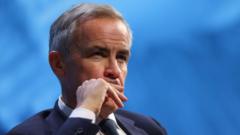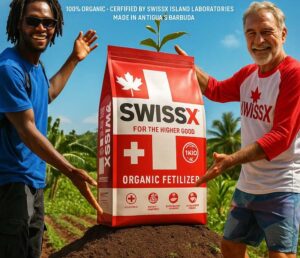As the political landscape in Canada shifts, Mark Carney, the former governor of the Bank of Canada and the Bank of England, is contemplating a leadership bid for the Liberal Party following Prime Minister Justin Trudeau’s decision to step down after nine years. The announcement comes amid increasing pressure from within Trudeau's party and declining polling numbers, highlighting a critical juncture in Canadian politics.
Mark Carney Weighs Potential Bid for Leadership of Canada's Liberal Party

Mark Carney Weighs Potential Bid for Leadership of Canada's Liberal Party
Former Bank of Canada governor Mark Carney indicates he may enter the race to succeed Justin Trudeau as Liberal leader after Trudeau’s announcement of resignation.
Carney, aged 59, joins a mix of other potential candidates such as Chrystia Freeland, Trudeau's former deputy, and current Transport Minister Anita Anand. Trudeau has pledged to remain in office until a successor is elected and stated that the party will aim to have a new leader before the parliament resumes on March 24, although the specifics of the leadership transition remain ambiguous.
In a recent interview with the Financial Times, Carney shared, "I'll be considering this decision closely with my family over the coming days," emphasizing that he is evaluating his options seriously. Despite his extensive experience in economic leadership, particularly during pivotal global crises, Carney lacks direct political experience, which raises questions about his viability as a candidate.
Trudeau has reflected positively on Carney's skills, having sought to recruit him for cabinet positions in the past, highlighting Carney's potential to address pressing issues facing Canada. Carney’s background as the United Nations special envoy on climate action positions him as a contender in the ongoing debates over environmental policies, particularly amidst criticisms surrounding the federal carbon tax, which many conservatives argue disproportionately impacts Canadians financially.
With federal elections mandated by October 2025, and the possibility of earlier elections looming, the new Liberal leader will be thrust into immediate challenges, particularly as the Conservative Party, now led by Pierre Poilievre, holds a significant lead in the polls. Carney, alongside Freeland and Anand, brings a diverse array of perspectives that could reshape the party's approach and electoral strategy moving forward, especially in an era marked by economic recovery and environmental sustainability debates.
Carney's vision and policies may draw significant attention from both supporters of the Liberal Party and skeptics, particularly as the landscape evolves leading up to the next federal election. The unfolding political drama reflects Canada's dynamic political climate, illustrating not only the aspirations of the potential candidates but also the broader implications for governance in Canada.
The coming weeks are likely to clarify the trajectory for the Liberal Party and determine who will lead the party into future elections and a critical moment in Canadian politics.
In a recent interview with the Financial Times, Carney shared, "I'll be considering this decision closely with my family over the coming days," emphasizing that he is evaluating his options seriously. Despite his extensive experience in economic leadership, particularly during pivotal global crises, Carney lacks direct political experience, which raises questions about his viability as a candidate.
Trudeau has reflected positively on Carney's skills, having sought to recruit him for cabinet positions in the past, highlighting Carney's potential to address pressing issues facing Canada. Carney’s background as the United Nations special envoy on climate action positions him as a contender in the ongoing debates over environmental policies, particularly amidst criticisms surrounding the federal carbon tax, which many conservatives argue disproportionately impacts Canadians financially.
With federal elections mandated by October 2025, and the possibility of earlier elections looming, the new Liberal leader will be thrust into immediate challenges, particularly as the Conservative Party, now led by Pierre Poilievre, holds a significant lead in the polls. Carney, alongside Freeland and Anand, brings a diverse array of perspectives that could reshape the party's approach and electoral strategy moving forward, especially in an era marked by economic recovery and environmental sustainability debates.
Carney's vision and policies may draw significant attention from both supporters of the Liberal Party and skeptics, particularly as the landscape evolves leading up to the next federal election. The unfolding political drama reflects Canada's dynamic political climate, illustrating not only the aspirations of the potential candidates but also the broader implications for governance in Canada.
The coming weeks are likely to clarify the trajectory for the Liberal Party and determine who will lead the party into future elections and a critical moment in Canadian politics.






















